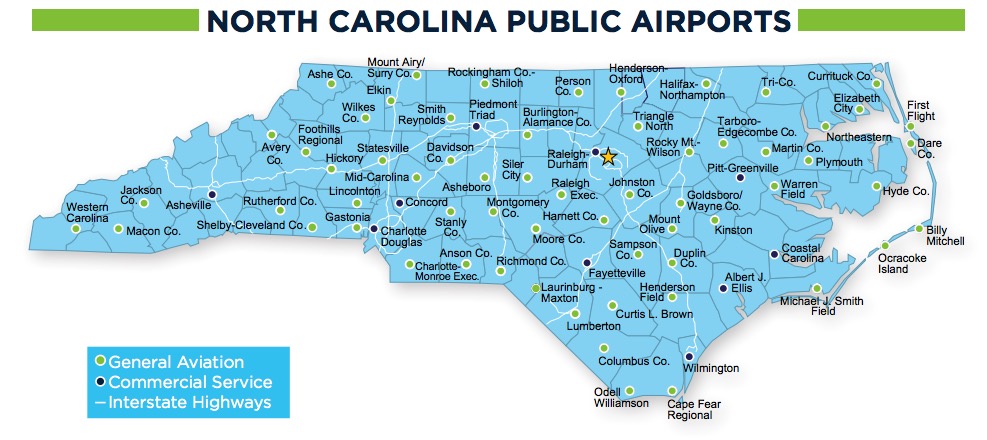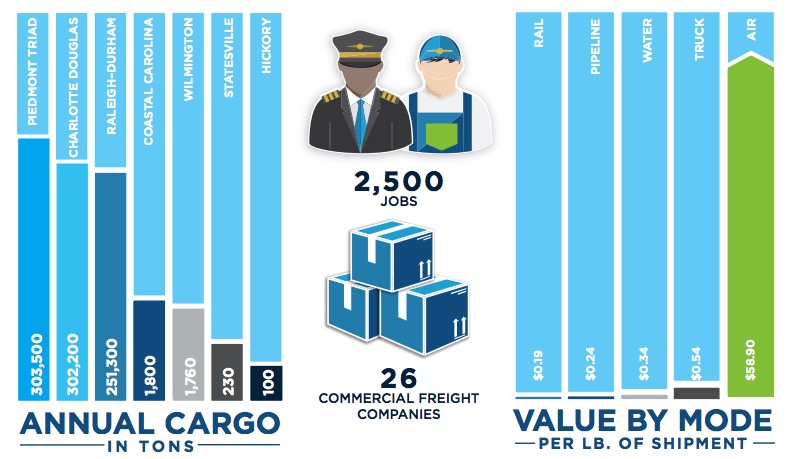NORTH CAROLINA: THE STATE OF AVIATION
North Carolina has been at the forefront of aviation since the Wright Brothers’ first flight at Kitty Hawk in 1903.
Our network of 72 publicly owned airports, and the aviation and aerospace assets that rely on them, help move our economy forward by creating jobs, supporting business growth and connecting people and companies to markets around the globe.
North Carolina’s public airports annually contribute $52 billion to the state’s economy, supporting 307,000 jobs that generate $12.6 billion in personal income and $2.2 billion in state and local tax revenues.
Aerospace giants Boeing, Cessna, GE Aviation, Honda Aircraft, Lockheed Martin and Spirit Aerospace Systems call North Carolina home, choosing our state for its connectivity, skilled workforce and business-friendly environment.
North Carolina boasts the nation’s second fastest growing aerospace manufacturing sector, with strong aerospace maintenance and military aviation enterprises, 14 commercial airline operators and 26 air freight companies. North Carolina is at the forefront of innovations catalyzing the growth of an unmanned aircraft systems (UAS or drones) economy.
This report highlights the significant economic impacts generated by North Carolina’s public airports and the many assets that support a vibrant and competitive aviation and aerospace sector. Both make North Carolina an ideal location to start, grow and locate an aerospace or aviation-related business.
We invite you to learn about the many ways North Carolina is the state of aviation and join us as we take aviation and aerospace innovation to new heights.
NORTH CAROLINA’S AIRPORT SYSTEM
North Carolina’s system of 72 public airports transport more than 62 million business and leisure travelers each year. They also move more than 850,000 tons of high-value, time-sensitive cargo such as medical supplies and advanced manufacturing components.
Ninety-four percent of the state’s population lives within a 30-minute drive of a public airport.
Sixty-two airports are classified as general aviation which connect local businesses and communities to global markets, house and refuel private aircraft, support military and agricultural aviation, and provide aviation services such as aerial photography and pilot training. Ten additional airports classified as commercial service airports also offer regularly scheduled air service.
All airports generate significant economic return for their communities and the state.
The N.C. Department of Transportation’s Division of Aviation, with funding from the State of North Carolina and the Federal Aviation Administration, supports airport development and operations with grants, longrange planning, technical assistance and airport management training.
The goal: Drive innovation and sector development that provides leading-edge aviation services for North Carolina, creating a strong aviation economy.
NORTH CAROLINA: PASSENGER SERVICE
Fourteen commercial airlines connect North Carolina travelers to 187 destinations worldwide.
All 10 commercial service airports continue to grow in passenger traffic, airlines and routes. Raleigh-Durham International Airport, for instance, added 12 new non-stop destinations in 2018, is adding a direct flight to Montreal in 2019, and is actively pursuing service to the Middle East and Asia. Charlotte Douglas International Airport, one of the world’s 10 busiest airports, added four routes in 2017 and is in the process of adding nine more by mid-2019.
Commercial airlines own more than $1 billion of property in North Carolina, which generates substantial tax revenues for the state.
NORTH CAROLINA: AIR CARGO
North Carolina airports provide freight air services in support of the state’s aviation economy. Air freight helps meet the global demand for the rapid movement of goods such as overnight packages and time-sensitive medical items.
LabCorp, the world’s leading health care diagnostics company based in Burlington, uses a fleet of aircraft to ship laboratory samples from patients for processing. The company processes more than 2.5 million specimens a week.
All airports connect their air freight systems to rail, port and truck freight systems, making them prime hubs for high-value goods traveling quickly and efficiently.
North Carolina ranks 15th among states in total tons of air freight cargo moved each year—more than 850,000 tons worth more than $23 billion. North Carolina ranks eighth in the country for employment in air freight services.
FedEx, the state’s largest air cargo serving company, moves 53 percent of the state’s total while UPS moves an additional 19 percent.
NORTH CAROLINA: SUPPORT INDUSTRIES
Airport-related businesses provide valuable support for airlines and airport customers, and boost the state’s economy.
Thirteen rental car companies serve the state’s 10 commercial services airports, many with locations at each airport. Rental car companies also serve many of the general aviation airports across the state. North Carolina benefits from an eight percent tax on short-term leases and rentals of motor vehicles, which totaled more than $76 million in 2015.
Additionally, retail shops operate at many of the airports, with 59 having a location in at least one North Carolina airport, providing an economic benefit while also serving passengers. Charlotte Douglas’ 35 shops and RaleighDurham’s 22 shops contributed more than $6 million in state tax revenues in 2015.
North Carolina’s airports are home to 74 restaurants, cafés and bars. Airport food service businesses contributed more than $8 million in state tax revenue in 2015.
Fuel suppliers also play a significant role in the aviation industry. The number of gallons of aviation fuel sold in the state has increased significantly over the last 15 years at an average annual rate of eight percent.
North Carolina gains significant returns from 3,300 aircraft based at the state’s general aviation facilities. For example, the owner of a $1.5 million aircraft based at Asheboro Regional Airport pays local property taxes equivalent to those paid by owners of 10 $150,000 homes.
Download full version (PDF): What Aviation Means to Our Economy
About the North Carolina Department of Transportation
www.ncdot.gov
“Our Mission: Connecting people, products and places safely and efficiently with customer focus, accountability and environmental sensitivity to enhance the economy and vitality of North Carolina.”
Tags: Aviation, NCDOT, North Carolina, North Carolina Department of Transportation







 RSS Feed
RSS Feed